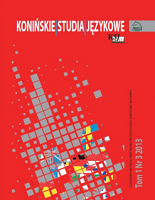English Philology students’ willingness to communicate as a reflection of learner autonomy
English Philology students’ willingness to communicate as a reflection of learner autonomy
Author(s): Teresa Maria WłosowiczSubject(s): Foreign languages learning, Higher Education
Published by: Akademia Nauk Stosowanych w Koninie
Keywords: willingness to communicate; motivation; anxiety; learner autonomy;
Summary/Abstract: The present study investigates first-year English Philology students’ willingness to communicate (WTC) in integrated skills classes over a period of one semester as a reflection of their autonomy and decisions to speak, as well as such factors as mo- tivation and anxiety. Given the complex nature of willingness to communicate (MacIntyre et al., 1998), it was decided to conduct a long-term study in order to observe the students’ willingness to communicate on a variety of topics. Simulta- neously, as WTC constitutes a volitional process (MacIntyre, 2007), it was assumed that WTC was to some extent a reflection of learner autonomy. Throughout the semester, some students would speak more often and more willingly, others less so, but, arguably, the decision to practice speaking English could result from plan- ning one’s learning and thus some degree of autonomy. However, in order to in- vestigate the students’ own perception of their WTC and their attitudes towards speaking English in class, the observation was complemented with a questionnaire carried out at the end of the semester, yet taking into consideration the possibility that the responses could be partly subjective (cf. Wilczyńska, 2011, p. 61). As the results show, despite the participants’ awareness of the importance of good speak- ing skills, their WTC varies greatly from one topic to another and from one student to another, which, on the one hand, confirms Pawlak and Mystkowska-Wiertelak’s (2015) observation that L2 willingness to communicate is dynamic in nature. On the other hand, as some students regularly show more WTC than others, to some extent it seems to be a trait which is related to their autonomy as learners and speakers, but also to anxiety, which differs considerably within the group.
Journal: Konińskie Studia Językowe
- Issue Year: 10/2022
- Issue No: 1
- Page Range: 11-37
- Page Count: 27
- Language: English

